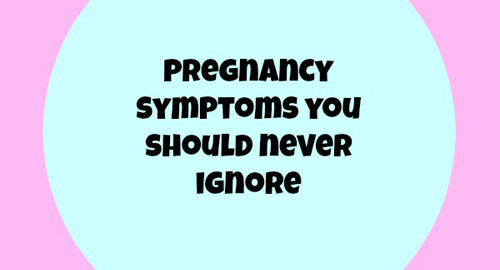- Clinic:
- 0733 945 717
- 0739 434 212

Are routine scans necessary in pregnancy?
August 2, 2024
Permanent contraception: the man or the woman?
August 7, 2024Pregnancy symptoms you should never ignore

Pregnancy is a natural phenomenon. About 80% of pregnancies are usually uncomplicated, while the other 20% may encounter serious problems requiring special attention. But there are so many aches and pains that arise during pregnancy, sometimes making it difficult for couples to decide when it is necessary to see their Obstetrician or midwife.
The first thing is to be as informed as much as possible about your pregnancy. Your carers are rich sources of information, and you should always take advantage of this. More information is readily available on print media and on the web.
In the first third of the pregnancy (first trimester), general symptoms like nausea and vomiting are pretty common. Remedies are easily available to avoid excessive dehydration and poor nutrition. However if unable to tolerate any fluids or feeds, risks tend to rise and a hospital visit is usually warranted. Mild pelvic discomfort, and even some blood spotting are common symptoms which tend to resolve spontaneously. However any bleeding that mimics a period, or pain of severe intensity always warrant a review. These portend the likelihood of a miscarriage or ectopic pregnancy, necessitating specific measures.
Once a miscarriage has been diagnosed, you can be left alone to allow for a spontaneous resolution. Other alternatives are the use of some tablets to enhance the process, or being taken to theatre for what is called a uterine evacuation. All the three options are pretty safe, with neither resulting to any long term health risks. Infections after a miscarriage are very rare. But gynecologists tend to be very cautious, and you may sometimes be given antibiotics if there was even the slightest suspicion of an infection.
The next third (second trimester), tends to be more relaxed. Risks of late miscarriage are significantly reduced and, the nausea and vomiting tend to resolve. However pain and bleeding still remain as serious symptoms warranting assessment. Some women may experience leakage of fluid through the vagina. This is also the earliest time that other complications may start to show up, for example a rise in blood pressure or poor glucose control. Being aware of the signs to watch out for is important. If unsure about the significance of any symptoms, it’s always best to check with your carers. Phone advice is often good enough,unplanned clinic visits can often be avoided.
The last third of the pregnancy (third trimester) has specific problems that may arise. Any bleeding must always be assessed as it may signify serious complications that may be life threatening. Unexpected uterine contractions or leakage of fluid prematurely may be signs of premature labor, warranting thorough assessment especially if remote from the due date. Headaches are fairly common in pregnancy, but are usually not severe and tend to resolve with simple painkillers. But if the headaches are severe, and if accompanied by visual disturbance and sudden swelling of the face and hands, this may indicate a condition called pre-eclampsia. The blood pressure usually rises, with grave maternal and fetal complications if left unattended. The baby should remain active throughout,any reduction in fetal movements should be evaluated promptly.
The above symptoms cannot be exhaustive. Sometimes you just don’t feel right. If this the case, please phone for advice and get reassured, rather than predispose yourself to preventable situations.
Take a fertility test today
